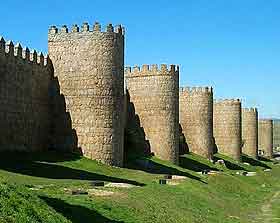
Biographical selection:
Teresa was at the Carmel of Toledo when the King of Portugal, Dom Sebastian, was killed and his army defeated at the great battle against the Moors at Alcacer-Quibir in Morocco in 1578. The saint had a revelation regarding the defeat. She was deeply saddened and wept, since she greatly desired Christendom’s advance and its enemies conquered.
She complained to Our Lord: “My God, why did Thou permit the defeat of Thy people and the victory of Thy enemies?” Our Lord answered her: “If I found them prepared to be brought into My presence, why are you afflicted?”
Her feeling of sorrow dissipated as she considered the glory the soldiers killed in battle were already enjoying. She admired those warriors whom God had found prepared for eternal happiness, especially considering the normally lax habits of soldiers. Immediately she desired to extend her Carmelite reform to Portugal.
She ardently prayed to know the divine will, and on the Feast of the Assumption, an answer came. Our Lord told her:
“My daughter, you will not go to Portugal to found the houses of your reform. Your daughters and sons will do this in the future when I will end the chastisement inflicted on Portugal, and employ My mercy with this country. The increase in numbers of good religious will give me cause to raise Portugal from the misery into which it will have fallen, restore to it the happiness it enjoyed of old, and be the promise of future glories.”
Comments of Prof. Plinio:
The excerpt deals with two inter-related subjects: the defeat of Alcacer-Quibir in 1578, and the foundation of Carmelite convents in Portugal.
First, St. Therese was praying when God revealed to her that the King Dom Sebastian of Portugal [who reigned from 1557-78] suffered the great defeat of Alcacer-Quibir. This battle proved to be decisive on several points.

(King Dom Sebastian of Portugal)
* If King Dom Sebastian – a very pious and virgin King, the last flower of old Portugal – would have been victorious, he would have broken the power of the Moors. Portugal could have founded a prosperous colony in North Africa, which could have been the bridgehead for a Catholic Africa. This would have shaken the Muslim power all around the world.
The Mohammedans occupied the Balkan Peninsula, Turkey, all of Asia Minor, and parts of Africa, Egypt, Tunis, Tripolitania, Algeria and Morocco. At that time the most dynamic part of the Muslim power was in North Africa. Therefore, if the Portuguese army would have conquered North Africa, this would have made it easier for other Catholic kingdoms such as Spain and France to follow after it. Portugal already had a bridgehead in Fez; at Alcacer-Quibir it was trying to extend its military position. For this reason, Alcacer-Quibir was a decisive battle.
For that overseas battle, King Dom Sebastian had assembled a large fleet at Lagos with a numerous army of Portuguese nobles and soldiers. It is said that he made an imprudent military maneuver against the Moors. He was killed in the battle, and the Portuguese power was broken. On the other hand, the Islamic power consolidated itself and gained force.
* This was not only very bad for the conversion of the Islamic nations, but was also favorable to Protestantism. For, freed from the Catholic threat in Africa, the Muslims were better able to concentrate on their attacks against Austria and Hungary. For that purpose they favored the Protestants there and in other countries that were also enemies of Catholic Austria and Hungary.
* This catastrophe also spelled a disaster for the independence of Portugal. Dom Sebastian left only one heir, his uncle Cardinal Dom Henrique, who became King. He was dispensed by the Holy See from his vow of chastity so that he might continue the Avis dynasty. But he only reigned two years [1578-1580] and never had children. The Portuguese crown passed by right of succession to King Philip II of Spain. The Portuguese dynasty disappeared. Therefore, the death of Dom Sebastian at Alcacer-Quibir represented very heavy damages for Portugal.
* Realizing all this, St. Teresa became sad and wept. She asked Our Lord why he had allowed this defeat. His answer to her was that the army was spiritually so well prepared that He took most of them to Heaven. You can see that this answer of Our Lord was a little evasive. The full answer came when He said that the defeat had been a punishment, and that the good religious to come would be one means to defer the chastisement.
You can see that the topic of this episode between St. Teresa and Our Lord is essentially a political and military concern about Portugal. This stands in opposition to a certain sentimental sweet mentality about the lives of saints, which almost never considers such facets. Everything has to be spiritual. This sham pious spirit abhors dealing with Catholic politics and military interests; it falsely assumes that the spiritual is so high nothing else matters. The true saint, it insinuates, doesn’t care about political and military affairs. In the episode recounted above between Our Lord and St. Therese, you can witness the opposite.
Our Lord showed the military defeat of King Sebastian in a mystical revelation to the great St. Teresa because He wanted to talk about it with her. God had a great interest in that battle. When the Catholic cause loses, saintly persons are supposed to be afflicted, as St. Teresa was. The two conversed, and Our Lord revealed to History His divine reason for the defeat.
* It is interesting to consider how beautiful the designs of God are. How Divine Wisdom has an infinity of facets that the human intelligence can never completely encompass. He responded to St. Teresa’s question by telling her that most of the Portuguese troops had been prepared for death, and so He had taken them. You can see that even at the moment that God was chastising that nation, His goodness was taking into consideration the spiritual state of those combatants. Perhaps He would have changed the moment of chastisement had the soldiers not been so well prepared for a good death. You can see His care, His goodness, His mercy.
Second, let me say only a word about the Carmelite Order. St. Teresa had the special mission of spreading the reform of Carmel. The mission of the Carmelites was, by means of prayer and penance, to attract the graces of God to those countries where the Carmelite Convents existed. A second dimension of their mission was to win those graces for all Christendom, and, in a third dimension, for the whole world, to convert everyone to the Catholic Religion.
When St. Teresa saw that the Portuguese nation was so fervent, she desired to found a convent there. Her wish was excellent and pleased God, but He postponed the founding. Why? Only Divine Wisdom knows.
But one consideration is that the Portuguese people would need a certain time to accept Spanish supremacy once the crown of Portugal had been incorporated to Spain – I just mentioned that King Philip II received the crown as the legitimate heir after the death of the Cardinal Dom Henrique. If the Spanish Carmelites would have gone to Portugal then, at the time St. Teresa desired, bringing another novelty, they could well have been poorly received. A period for adaptation seemed to be necessary. Perhaps this was one of the reasons why Our Lord delayed in sending the Spanish Carmelites to Portugal. After the union of the two kingdoms, the presence of the Spanish Carmelites in Portugal followed naturally and produced immense spiritual fruits.
As a conclusion, we can see how important it is to follow the events and news of our times to the measure that they are related to the salvation of souls, the Catholic cause, the defeat of the Revolution, and the glory and exaltation of the Holy Church. This should be for us an act of love of God characteristic of our counter-revolutionary vocation, since it is to act in present day events.
Let us ask St. Teresa to give us this invaluable grace.

(Walled city of Avila)









2 comments:
St. Teresa is my patron saint, so thanks for this post. I hope to buy her book The Interior Castle soon. Amazing that her writings are still profound and popular all these hundreds of years later.
Yes Shirley,
Isnt it amazing how all the books by the saints are so relevant today so many years after they were written.
Post a Comment